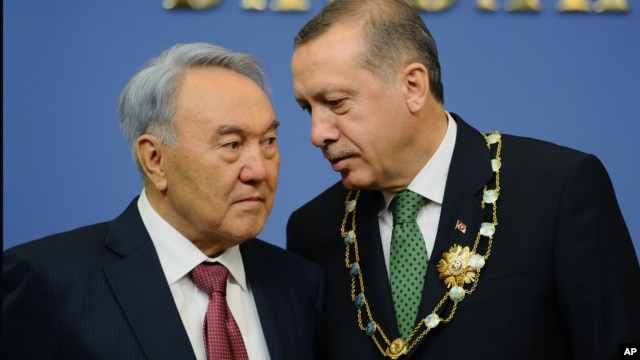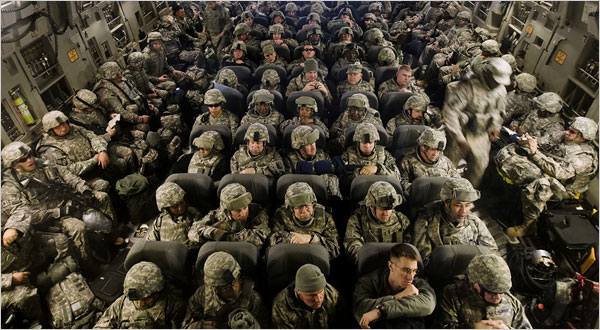NATO says plans in place to defend Turkey from Syrian attacks
Published October 09, 2012
Associated Press
BRUSSELS – NATO is ready to defend Turkey, the alliance's top official said Tuesday, in a direct warning to Syria after a week of cross-border artillery and mortar exchanges dramatically escalated tensions between the two countries.
Ankara has sent additional fighter jets to reinforce an air base close to the frontier with Syria where shells killed five Turkish civilians last week, sparking fears of a wider regional crisis. Syria has defended its shelling of neighboring Turkey as an accidental outcome of its 18-month-old civil war.
The comments by NATO Secretary-General Anders Fogh Rasmussen were the strongest show of support to Turkey since the firing began Wednesday -- though the solidarity is largely symbolic.
NATO member Turkey has sought backing in case it is attacked, but despite publicly supporting Syria's rebels Ankara isn't seeking direct intervention. And the alliance is thought to be reluctant to get involved militarily at a time when its main priority is the war in Afghanistan.
"Obviously Turkey can rely on NATO solidarity," Fogh Rasmussen said ahead of a meeting of NATO defense ministers in Brussels. "We have all necessary plans in place to protect and defend Turkey if necessary."
When pressed on what kind of trouble on the border would trigger those plans, NATO's chief said he could not discuss contingency plans. "We hope it won't be necessary to activate such plans, we do hope to see a political solution to the conflict in Syria," he said.
NATO officials said the plans have been around for decades and were not drawn up in response to the Syria crisis. They spoke on condition of anonymity because they were not authorized to talk to the press.
In an address to lawmakers from the ruling party, Turkish Prime Minister Recep Tayyip Erdogan reiterated that Ankara will continue retaliating for attacks from Syrian President Bashar Assad's regime.
"Every kind of threat to the Turkish territory and the Turkish people will find us standing against it," Erdogan said. "Soldiers loyal to Assad fired shells at us, we immediately reacted and responded with double force. We shall never stop responding."
At least 25 additional F-16 fighter jets were deployed at Turkey's Diyarbakir air base in the southeast late Monday, Turkey's Dogan news agency said, quoting unidentified military sources. The military's chief of staff inspected troops along the border with Syria on Tuesday.
But despite the flare-up in recent days, there appears little appetite in Turkey for a war with Syria, said Volker Perthes, the director of the German Institute for International and Security Affairs.
Only a sudden change in the situation on the ground could draw Turkey into what has so far remained a domestic conflict, said Perthes.
"If the humanitarian situation becomes even worse, where you have more massacres, where at some point even the Russians wouldn't block a U.N. Security Council resolution ... then who could do the job of protecting civilians? It would be Turkey in the first place," he said.
Joshua Alvarez, managing editor of the Istanbul-based Kalem Journal, said it was very unlikely that Turkey would call on NATO and force a decision on a commitment unless hostilities with Syria sharply increase.
"Turkey will continue to seek as many reassurances as it can, but Turkey will not put its foot down and demand a commitment from NATO," said Alvarez. "Turkey is aware of NATO's extreme reluctance about repeating a `Libya-styled' campaign in Syria, a much more complex and difficult scenario. Turkey wants no part of such a campaign, either. "
NATO established a no-fly zone to protect civilians during last year's Libyan revolt against longtime dictator Moammar Gadhafi. Western diplomats said enforcing the zone required taking out Libya's air defenses and attacking tanks and military vehicles that posed threats to civilians.
Ankara's reluctance to go it alone in Syria was voiced Tuesday by Turkish Deputy Prime Minister Ali Babacan.
"Whichever step we take, it will be taken in consultation with our friends and our allies and in agreement with them," he said. "This is not a Syrian-Turkish bilateral issue, it is a humanitarian issue and we think that at the same time it's an issue that should be viewed as a regional security issue. The Arab League is involved, the Islamic Conference Organization is involved and NATO is a part of it."
Syrian opposition activists estimate more than 32,000 people have been killed since March 2011 when the uprising against Assad's regime began. Initially, regime opponents launched a wave of peaceful protests that were met by repeated attacks by security forces, and the conflict has gradually turned into bloody civil war that has motivated tens of thousands of civilians to flee Syria. The fighting has devastated entire neighborhoods in Syria's main cities, including Aleppo in the north. Syria's government has always blamed the uprising on what it calls foreign terrorists.
A Sunni extremist group called Jabhat al-Nusra claimed responsibility for an attack on Syrian air force intelligence compound in the Damascus suburb of Harasta Monday evening. A statement on a militant website by the group's media arm, Al-Manara al-Bayda, said the bombing aimed "to avenge the killing of Muslims and those who suffered injustice."
The Syrian state-run news agency did not report the explosion and there were conflicting reports on how badly the compound was damaged. There were no official reports on casualties, but the pro-government Al-Ikhbariya channel said on Monday the blast was heard across Damascus.
Turkey's state-run Anadolu Agency, reported that Syrian Nation Council leader Abdulbaset Sieda visited rebel-controlled areas in Syria on Tuesday.
It said he entered Syria from the Bab al-Hawa border crossing and "made observations in rural areas" of Idlib province before traveling to Aleppo's Etarib area where he met with commanders of the Free Syrian Army. If confirmed, the trip would be al-Hawa's first into Syria since he became the council's leader in June.
On his return to Aleppo, Anadolu quoted Sieda as saying: "We are here to see what the opposition in Syria and the opposition outside of Syria can do together to serve the Syrian people."
Sieda made the trip ahead of an Oct. 15-17 meeting of Syrian opposition groups in Qatar.
Meanwhile, two Syrian rebels told The Associated Press that seven military and intelligence officers belonging to Syria's ruling Alawite minority have defected to Jordan. The rebels said they helped the seven cross into Jordan on Monday, and that the highest-ranking figure among them was an army colonel.
Defections by Alawites, who make up the backbone of Assad's regime, are relatively uncommon. Almost all the defections have been from Syria's Sunni majority, who dominate the rebellion.
Three other Alawite intelligence officials came to Jordan three weeks ago, said the two rebels, who spoke to the AP on condition of anonymity for fear of reprisals from the Assad regime. Jordanian officials declined comment.




 Reply With Quote
Reply With Quote The BBC was not allowed to see the contents of this crate, found in a rebel base in Aleppo
The BBC was not allowed to see the contents of this crate, found in a rebel base in Aleppo  Cannot play media. You do not have the correct version of the flash player.
Cannot play media. You do not have the correct version of the flash player. 







 Turkey has deployed 250 tanks along its southern border with Syria amid rising tensions with the Damascus government over the past few days.
Turkey has deployed 250 tanks along its southern border with Syria amid rising tensions with the Damascus government over the past few days. 
 Smoke rises above Azmarin village from clashes between the Syrian army and rebels along the Turkish border Photo: |Onur Coban/REX FEATURES
Smoke rises above Azmarin village from clashes between the Syrian army and rebels along the Turkish border Photo: |Onur Coban/REX FEATURES

Bookmarks